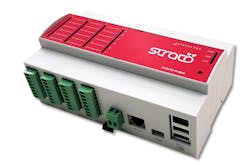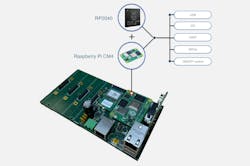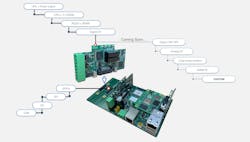What you’ll learn:
- How to use a Raspberry Pi in a PLC.
- Why modular PLCs make sense.
- What is a Raspberry Pi Compute Module?
Sfera Labs expanded its Strato Pi of DIN-rail, programmable-logic-controller (PLC) servers with the Strato Pi Max (Fig. 1). This modular system is based on a Raspberry Pi Compute Module 4 and a RP2040. I talked with CEO Ulderico Arcidiaco about the company’s latest offering (see the video above).
Sfera Labs has taken advantage of the popularity of the Raspberry Pi Compute Module for some time now. This latest incarnation switches from more dedicated interfaces to a multi-slot expansion board approach. The host controller is a Raspberry Pi Compute Module 4 that includes a x1 PCI Express (PCIe) interface while the RP2040 provides dedicated peripheral control (Fig. 2).
The Compute Module is built around a Broadcom BCM2711 with a 1.5-GHz, 64-bit, quad-core Arm Cortex-A72 processor and up to 8 GB of LPDDR4-3200 DRAM plus 32 GB of eMMC flash memory. It can support dual-band, 802.11 b/g/n/ac Wi-Fi and Bluetooth 5.0. The RP2040 is a 133-MHz, 32-bit, dual-core Arm Cortex-M0+.
The platform also comes equipped with 10/100 and 1 G Ethernet ports, dual USB 2.0 ports, dual MicroSD slots, and an M.2 PCIe SSD socket. The dual MicroSD slots make it easier to implement upgrade and fallback. In addition, there’s support for the Zymbit Secure Compute Module, a hardened form of the Raspberry Pi Compute Module.
The Strato Pi Max has four slots. Versions are available with fewer slots, which means a corresponding size reduction (Fig. 3). The expansion bus includes USB, I2C, SPI, and GPIO interfaces. The current crop of expansion modules features digital and serial IO as well as a UPS/external battery interface with optional power outputs. Analog, communication, and other expansion options are on the drawing board.
Modular PLC controllers offer PLC developers a system that’s easier to design with, while providing a standard compute platform. They can add custom peripheral boards without the need to design and maintain a host and peripheral control system. The Raspberry Pi base allows for easy migration of Raspberry Pi-based application prototypes. Armed with the ability to select the Compute Module, companies are able to deliver a range of functionality without creating a large set of individual products.


